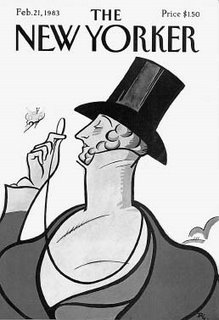

Today's edition of In the Penny Press will pass over the current New Yorker virtually in silence. This isn't just because the issue was a little short on interesting content, although it was.
No, the main reason is because the issue's MESSAGE is a little irritating.
The black and white photo accompanying Antonya Nelson's boring short story "Kansas" shows an 8-year-old girl, deep in thought, sucking on a cigarette. The very next piece, about Bob Dylan, has a black and white photo of the singer, about 18, deep in thought, sucking on a cigarette.
The issue's message: all smart, cool people smoke.
So on we skip to the latest issue of New York magazine.
The issue in question is a double-sized fall preview thing, with lots of room devoted to upcoming fall books. There's an interview with Heidi Julavits and one with Nell Freudenberger, and the relative merits of those interviews notwithstanding, I couldn't help noticing that both women are very pretty.
This could be coincidence, of course. Considering all the young authors out there snapping up six-figure book deals, it stands to reason SOME of them will be easy on the eyes.
But I doubt it. Here in the brackish stillwater of Stevereads, allow me to vent my suspicion that these young women get their six-figure book deals BECAUSE they're pretty, not ALONGSIDE that fact.
Not to say they don't have talent (although I've read their respective books, and I wasn't exactly tripping over all the great prose, if you follow my meaning) - but today's publishing industry seems to want more than talent or probity from the new young names from whom it's hoping for so much. It's not enough anymore that you write well - you have to LOOK good doing it, enthusing on Oprah in a halter top.
I know, I know - some of you might be wondering if this is sour grapes (although not all THAT sour, since I, unlike many of my young friends, don't work especially hard to get published). I'm not published, and my envy is causing me to cast asperions on those who are.
Well fine! If you think that way, hie thee to the nearest Barnes & Noble and start flipping books over! Show me one DEBUT novel currently in hardcover whose jacket photo reveals its author to be anything below, say, an 8.
You won't be able to. They aren't there.
Now one or two pretty girls getting book deals I'm prepared to accept as the statistics of a wide spectrum. But if ALL the young men and women are gorgeous or near to it, I start to think that's part of why they got the job.
And if that's the case, I'm not outraged for myself, of course (as you all know, I'm a stone-cold super-hottie). I'm outraged for Dawn Powell, who could write the pants off any of these sleeveless runway models, but who'd never get published today because she strongly resembled ticked-off English bulldog.
Fortunately, there was the Approval Matrix! Here's a sample of this week's breakdown:
Highbrow Brilliant: "Paul Giamatti has signed on to play Philip K. Dick"
Lowbrow Brilliant: "The new superhero stamps"
Highbrow Despicable: "Have you read a Philip K. Dick novel? Great ideas, horrible prose."
Lowbrow Despicable: "The JonBenet Ramsey murder circus lurches back to creepy life."
Hee.
But the most arresting piece in this issue was John Leonard's essay on Gunter Grass' revelation of his membership in the Waffen SS.
Leonard shows himself to be a sensitive and appreciative reader of Grass (something I fancied myself to be, at one point), and the gist of his essay is that what Grass has given to Western intellectual life is greater than what his revelation takes away from it.
About Grass he writes "He was not pure. Surely that is as much a part of his authority as of his psychodynamic. What else are his books about, and not secretly?"
This is a spirited defense, and many of you have responded to my earlier post on the subject with strong echoes of it. 'The disgrace can't touch the novels,' you say, and because the one thing all of you posters to this site seem to have in common is your impressive intelligence (except for you of course, Beepy), it's made me pause and think.
You've pointed out that an author's personal life - and any failings therein - CAN'T factor into our appreciation of their work. Many of you have cited all the superb authors in the course of history who were also horrible human beings.
So I was deeply engaged with Leonard's piece, right up until the last paragraph, where two things happen: first, his spirited defense of Grass goes too far, and second, he stops writing in English -
Never mind, because we live in a culture where all confessions must undergo a scarifying rite and assume a therapeutic form as rigid as Kabuki, usually involving cable television and Betty Ford; where instant opinions are available in color-coded blister packs, for niche shopping; where everything, including great novels and soul-shriving secrets, will be read through a screen of prurient self-interest by fat-back bravos and heat-seeking piffles in the moral indignation racket. I wonder what planet these people come from.
Presumably one in which hyperventilation doesn't count as a writing-style, but that's not the point. The point is, this isn't "Repo Man." You don't get to blurt out "I blame society."
When a world-renowned and respected novelist comes forward and reveals that he was a card-carrying Nazi, you don't have to be part of a blame-game society to be disgusted. For Leonard to insinuate that we're all somehow ganging up on Grass, that the disgust and outrage that have greeted his announcement are somehow artificial or insincere ... well, that's turning the whole story on its head.
The fact is, Grass' story reeks of self-serving deception, even now. His claim that the reality of the Holocaust only came home to him when he saw the glasses, the shoes, the coats - the un-abstractable evidence of mass slaughter ... and his repeated allusions to some kind of 'drafting' process ... they smell of cod liver oil.
Here's what I think happened: the teenage Grass didn't need to be dragged kicking and screaming from the bosom of his family to join the Waffen SS - like thousands of similar young men, he did it willingly. Proudly. And most of all, informedly. Hitler had been making speeches for TEN YEARS about the iniquities of the Jews. For TEN YEARS, he'd been promising large-scale race-violence if he were ever given the power to carry it out. Grass wasn't some tallow-maker's imbecile bastard; he was plenty smart enough to know what he was doing.
Then the war was lost, and Hitler was gone, and right alongside those things, perhaps, Grass (again, like thousands and thousands of his countrymen) started ... I almost want to say he started waking up, as from a bad dream. He started realizing that regardless of his motives, regardless of the outcomes, he had joined in doing something EVIL, and he was increasingly aware of that fact and ashamed of it.
I don't allow to any half-way intelligent German citizen during the Nazi regime the alibi of saying they were hoodwinked, about anything. But likewise I don't forbid them the validity of exactly that kind of moral awakening, or re-awakening.
So the question is: what do we do with the novels of a man who, fifty years ago, was an fervent, party-line believing Nazi (as opposed to a weekends-only partial indoctrinee, like the current Pope)?
The novels are strange and strong and almost invariably memorable. And several of you tell me that fact should stand separate from everything else. Leonard clearly believes that - it can't touch the novels.
But these were the NAZIS! Where does this literary non-judgementalism take us? What if Idi Amin wrote beautiful poetry? Hell, what if Hitler did? You tell me I'm hasty and Jesuitically absolute for declaring the novels anathema because of what the man did decades ago and then came to regret. But what the man did was morally enormous. Giving his novels a free pass in spite of that fact feels ... I don't know - tolerant? Hypocritical?
Collaborative?

2 comments:
By "impressive intellect" I take it that you mean someone who is NOT reading your blog just hoping to see their name mentioned. Beepy
While being blandly "attractive" does help Heidi Julavits, in her case I think a large boost has to be credited to her membership in the Eggers Gang. And I also agree with Sam Well that cutting-edge modern-day makeup and lighting can do wonders with someone of merely "average" or "everyday" looks. I mean, not to be cruel about it, but you brought up the topic and frankly Nell Freudenberger, while certainly pleasant-looking is not really anyone's idea of a Maxim cover girl -- thank god. And certainly it works both ways, genderwise, right Mr. Sebastian Junger? But to your overall point, are publishers looking for prettier authors to put on Oprah? Sure, absolutely. But obnoxious and toxic as these things may seem, they tend to sort themselves out over time -- after all, where oh where is Tama Janowitz these days? Sure, publishing has become more and more like the movie industry, but also like movie stars, hot authors may get a face in the door earlier and shoot up higher, but in the long run, the pretty no-talents will slide off to the literary equivalent of Hollywood Squares, while the true talents, pretty or average or hideous, will carry on.
Post a Comment